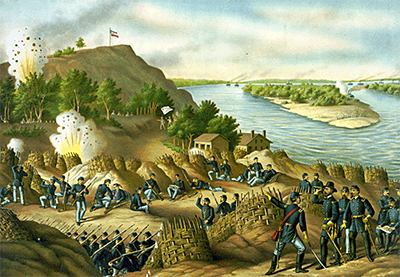The Battle of Vicksburg
The Battle of Vicksburg was a vitally important Union victory during the American Civil War. Taking the heavily fortified city gave the Union control of the entire Mississippi River, effectively splitting the Confederacy in two. 
Vicksburg was Mississippi's second-largest city. Only Natchez was bigger. During the Civil War, many referred to Vicksburg, atop a 200-foot bluff overlooking the Mississippi River, as the "Gibraltar of the Confederacy," after the famed Rock of Gibraltar at the southern tip of Spain. In the same way that Great Britain, which occupied Gibraltar, could influence shipping traffic at the western end of the Mediterranean Sea, Confederate troops could patrol traffic up and down the Mississippi from its "Gibraltar," Vicksburg. 
In 1862, Union forces under Admiral David Farragut had taken New Orleans and then blitzed by Vicksburg but, without sufficient land forces, had been unable to do much damage. During this same time period, land forces in the Army of the Tennessee, having seized Fort Donelson and Fort Henry in Tennessee under Maj. Gen. Ulysses S. Grant (right), were converging on Vicksburg by land. A December 1862 assault by men of Maj. Gen. William T. Sherman's corps met with heavy resistance, was unsuccessful, and resulted in heavily uneven casualties: 1,800 Union and 200 Confederate. Subsequent land-based initiatives failed to make progress, and Grant decided to coordinate army and navy actions. A Union fleet under Rear Admiral David Dixon Porter outran Vicksburg's guns on April 16, 1863, and made it to Hard Times, La., to rendezvous with Grant. The idea was for the fleet to transport the army from the west bank of the Mississippi to the east, so as to be able to threaten Vicksburg from the rear. The accommodating fleet transported 24,000 men and 60 guns from one bank to the other, and both forces moved north. The army captured the port towns of Grand Gulf and Port Gibson, on May 1 and then headed toward Jackson, the state capital. After a skirmish at Raymond, just west of Jackson, on May 12, the Union troops marched on. Arriving at the state capital in the meantime was Confederate Gen. Joseph Johnston, who had been wounded at the Battle of the 7 Days and had been sent to Mississippi as commander of the Department of the West. Johnston, aware of the size of the 45,000-man-strong Union army approaching, ordered his force of 6,000 to evacuate. Union troops arrived in the city, damaged some of its infrastructure, then withdrew. Commanding the Vicksburg garrison was Lt. Gen. John C. Pemberton. This commander was from Pennsylvania but had chosen to fight for the Confederacy in deference to his Southern wife. Hoping to sever the Union supply line, he marched out of Vicksburg with 17,500 troops. The result was the Battle of Champion's Hill, a Union victory. Again, at Big Black River Bridge, the two sides traded blows. Again, Union forces prevailed. Pemberton led his men back to Vicksburg, burning bridges behind them as they went. Pemberton had ordered constructed a series of defenses on the perimeter of the vital city. Union troops threw themselves into the fighting time and again and sustained heavy casualties. Grant then decided that the way to take Vicksburg was by siege. 
By the end of June, Union forces numbered 70,000 and Confederate forces numbered 30,000. The defenders were ensconced behind thick walls and had the benefit of the high ground; however, they were surrounded and no longer had access to reliable supply lines. In fact, the city had been cut off for several weeks. Union troops built 15 miles of trenches around the city and then, their supply lines intact, settled in to wait. Day after day, shells from Union guns on land and on ship rained down on Vicksburg. The people inside the city hid in caves and resorted to eating animals to survive. On July 3, Pemberton agreed to surrender. Grant, accepting the terms, allowed the parole of the captured soldiers. On July 4, more than 29,000 Confederate soldiers marched out of the city and piled up their guns as a symbol of their surrender. Vicksburg was in Union hands, as was the Mississippi River. The last Confederate-held stronghold on the river, Port Hudson, also surrendered. It was on the very same day that Vicksburg surrendered that the Army of Northern Virginia was retreating from Gettysburg. Tempering the twin highlights for the Union somewhat was the refusal of the Confederate soldiers who had surrendered at Vicksburg to refrain from re-enlisting. |
|
Social Studies for Kids
copyright 2002–2025
David White




